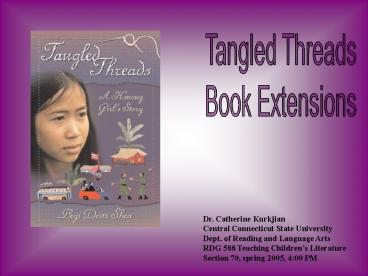Tangled Threads - PowerPoint PPT Presentation
Title:
Tangled Threads
Description:
Dr. Catherine Kurkjian Central Connecticut State University Dept. of Reading and Language Arts RDG 588 Teaching Children s Literature Section 70, spring 2005, 4:00 PM – PowerPoint PPT presentation
Number of Views:66
Avg rating:3.0/5.0
Title: Tangled Threads
1
Tangled Threads Book Extensions
Dr. Catherine Kurkjian Central Connecticut State
University Dept. of Reading and Language Arts RDG
588 Teaching Childrens Literature Section 70,
spring 2005, 400 PM
2
Thinking Deeply about Books with Pegi Deitz Shea
Author Pegi Deitz Shea visited our class on the
evening of our literature circles to discuss her
books The Whispering Cloth A Refugees Story and
its sequel Tangled Threads. She gave our class an
insiders view on the development and background
of the writing of these amazing books. We viewed
slides of her trip to Thailand and the refugee
camp in which part of the story takes place. Pegi
shared artifacts from the story including a
Hmong storycloth, a pandau, that is integral to
both books. The class shared their literature
circle response projects and Pegi shared
interesting asides about aspects of these
powerful books.
3
ABC Powerpoint
Ali, Marcie and Kimberly created an amazing ABC
PowerPoint presentation that addresses aspects of
the Tangled Threads from A to Z along with quotes
from the book to illustrate what is being
portrayed for each letter of the alphabet. Click
on link to view.
4
Tangled Threads Retold in Pictures
Katrina, Melissa, Erin, and Elena retold the
important events in chapters in Tangled Threads
in pictures.
Melissa shares a calendar.
5
Suzanne, Marrissa, Robyn N., Elizabeth, and Cindy
created a web representing Mais relationships to
the people in her life. These includes Miss
Susan, Yer, Grandmother and her cousins.
6
Character Bookmarks
This literature circle group created character
bookmarks for their response project. Each member
(from left to right Amy, Debbie and Roger)
selected two different characters and provided an
insightful analysis of the characters they chose.
7
Posters Extending Background Knowledge
Michelle P., Jenn Castelli, and Robyn S. created
posters to extend background knowledge about
history, conditions at the refugee camp, and
Hmong culture.
8
Storycloths
Jodie, Carrie, and Paula created storycloths
describing important aspects of selected
characters lives. Paula explains Creating a
pandau was the perfect way to describe the key
events in Mais life. The border consists of
triangles that symbolize a barrier like the one
that was put around her at the refugee camp. By
placing a car on a curvy road, I was able to
establish the ups and downs that existed in her
young life. The rice, elephant, and thread
represent the part of Mais life that she was
ready to leave behind, while the globe and flag
represent her excitement about coming to America.
As she adjusts to her new home, Mais
experiences with food, clothes, and school help
define who Mai will become as a Hmong-American.
But letting go of her resentment in regards to
the family secret will be her greatest gift of
all!
9
Visit Pegis Website for more information on her
wonderful books. Visit The Hmong Home Page
at http//hmongnet.org to gain more insights
about the characters in Tangled Threads.































